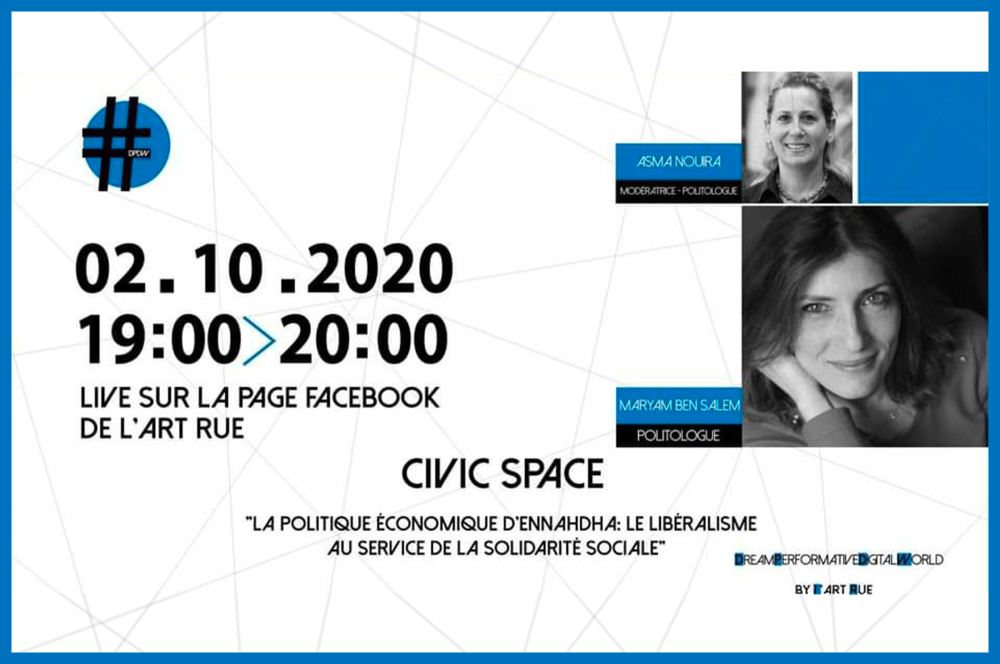Debate : “The political economy of Ennahdha: Liberalism at the service of solidarity”
Asma Nouira in conversation with Meryam Ben Salem
L'Art Rue
L'Art Rue’s DPDW program is supported by DIGNITY - Danish Institute Against Torture - Danish- Arab Partnership Program
For its first meeting of the 2020 school year, Civic Space invites Maryam Ben Salem, political scientist, lecturer and doctor of political science, to participate in a debate on the following theme: "Ennahdha's economic policy: Liberalism at the service of social solidarity" as well as the critically acclaimed article she wrote.
This conversation between Maryam Ben Salem and Asma Nouira seeks to examine the Ennahdha movement’s economic policy; a neoliberal policy that relegates redistribution to the sphere of private charity. Three explanatory factors are thus debated: the absence of a clear economic vision in the 70s and 80s; the compatibility between the Islamist ethos and neoliberal politics; and the attributes of the Ennahda electorate, which steered the movement towards a policy approaching the conservatism of G.W. Bush.
About the panelists
Maryam Ben Salem is a political scientist, lecturer, and professeur agrégé in political science at the Faculty of Law and Political Science of Sousse. She holds a DEA in political science from the Saint-Joseph University of Beirut and a PhD in political science from the University of Paris 1 Panthéon Sorbonne. From 2009 to 2014, she worked as a political scientist at the Arab Women's Center for Training and Research - CAWTAR. Her research focuses on political Islam, political and religious engagement, protest participation, electoral participation, and gender. She has published several articles and contributed to collective works and research, including: Maryam Ben Salem, "Digitalization and political science in Tunisia", in: Hellen Millner and Marianne Kneueur (Eds.), Digitalization and Political Science. Global Perspectives, Barbara Budrich Publisher, 2019, pp. 261–270; Maryam Ben Salem, "Fluidité politique et transition ‘incertaine’ d'Ennahdha vers l'islamo-démocratie“ (“Political fluidity and Ennahdha’s ‘uncertain’ transition towards Islamo-democracy”) in Hatem Mrad (Dir.), Partis politiques et transitions démocratiques : Renouveau politique et repositionnement, (Political parties and democratic transitions: political renewal and repositioning) Tunis, Nirvana, 2019, pp. 153-184 ; Maryam Ben Salem, “The foreign policy of Tunisia's Ennahdha: constancy and changes”, in Mohamed-Ali Adraoui (Eds.), The Foreign Policy of Islamist Political Parties. Ideology in Practice, Edinburgh, Edinburgh University Press, 2018. pp. 47-69 ; Maryam Ben Salem, “The National Dialogue, Collusive Transactions and Government Legitimacy in Tunisia”, The International Spectator, 51:1, 2016, 99-112.
Asma Nouira is a lecturer in political science, directing university research and director of the department of political science at the Faculty of Law and Political and Social Sciences of Tunis, Tunis El Manar University. Her main area of research is the relationship between religion and politics, with particular emphasis on the relationship between state and religion in Tunisia from a comparative perspective with the Arab and Muslim world as well as with Western historical experiences. She has also worked on several themes such as political parties, gender, decentralization, democratization, and human rights. She co-founded the Tunisian Observatory of Democratic Transition in 2011. She participated in the H2020 project (MedReset), between 2016 and 2019, as a project partner and work package leader.
Practical information
Friday 2 October 2020 at 19:00
Duration
1 hour






